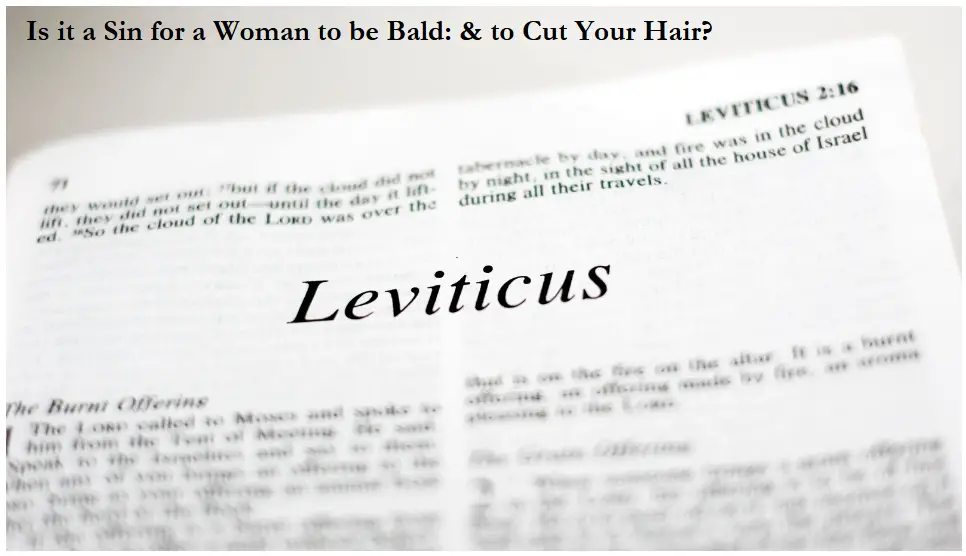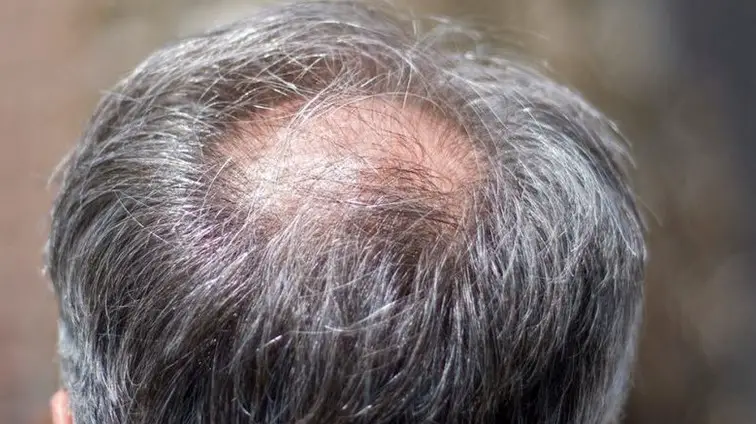Explore the biblical perspective on hair and baldness in our comprehensive guide ‘Is it a sin for a woman to be bald?’. Delve into the interpretation of ‘Leviticus 19:27’ and the question ‘Is it a sin to cut your hair?’ in their historical and cultural context. Discover modern views on hair loss and spirituality.
In the vast expanse of human history and culture, hair has often been a symbol of beauty, strength, and even spiritual significance. But what happens when hair is lost? Specifically, what does it mean for a woman to be bald? And more importantly, is it a sin for a woman to be bald? These questions may seem unusual, but they are not uncommon, especially when viewed through the lens of religious and biblical interpretations.
The Bible, a cornerstone of Christian faith, is often referred to for guidance on a myriad of topics. However, its verses and teachings are steeped in historical and cultural contexts that can sometimes lead to misunderstandings in our modern world. One such topic is the concept of hair and baldness. Is baldness a sin? Does the Bible provide any guidance on this?
In this article, we delve into these questions, exploring the cultural context of hair in biblical times, interpreting key scriptures, and understanding their implications in today’s world. We’ll also address common misconceptions and provide a modern perspective on hair, baldness, and spirituality.
Whether you’re curious about the biblical perspective or seeking answers for personal reasons, this article aims to provide a comprehensive understanding. So, let’s embark on this enlightening journey together.
Before we dive in, you might find it interesting to read about why men go bald and women don’t in this article. It provides a scientific perspective on hair loss, which could be a great complement to the spiritual and cultural perspectives we’ll explore here.
Takeaways
Our exploration of the topic ‘is it a sin for a woman to be bald’ has led us through a fascinating journey through biblical texts, historical contexts, and modern perspectives. Here are the key takeaways from our discussion:
- The Bible uses hair as a symbol in various contexts, representing everything from beauty and strength to religious devotion and divine care. However, it does not explicitly state that baldness, in women or men, is a sin.
- Verses like Leviticus 19:27 and 1 Corinthians 11:14 need to be interpreted in their historical and cultural context. They do not provide a general prohibition against cutting hair or a blanket rule that long hair is disgraceful for men.
- The Bible encourages us to focus less on physical appearances and more on our inner selves and our relationship with God. Verses like 1 Peter 3:3-4 emphasize the importance of inner beauty and spiritual growth.
- In our modern world, hair loss is understood from scientific, psychological, and spiritual perspectives. It’s not a sin or a moral failing, but a natural occurrence that can be a result of various factors.
- Dealing with hair loss requires both practical solutions and emotional support. If you’re dealing with hair loss, you might find this article on thin natural hair helpful. It provides practical advice on dealing with hair loss, which complements the biblical and spiritual perspectives we’ve discussed here.
Stay with us as we unravel the mysteries of hair and baldness in the Bible, and what it means for us today.
The Cultural Context of Hair in Biblical Times
In the ancient world, hair held a significant place in society, and this was no different in the biblical era. Hair was not just a physical attribute; it was a symbol of various societal and spiritual aspects. Understanding this cultural context is crucial when we explore the question, is it a sin for a woman to be bald?
In biblical times, long hair in women was seen as a sign of femininity and beauty. It was also considered a woman’s glory, as stated in 1 Corinthians 11:15: “But if a woman has long hair, it is her glory? For long hair is given to her as a covering.” This verse implies that a woman’s hair was seen as a natural veil, a symbol of modesty and respectability.
On the other hand, baldness or short hair in women was often associated with disgrace or mourning. In some instances, it was a punishment or a sign of disgrace. For example, in Isaiah 3:24, the Bible speaks of God punishing the daughters of Zion by making them bald.
However, it’s important to remember that these interpretations were heavily influenced by the societal norms and beliefs of that era. They reflected the cultural and societal standards of beauty and propriety at the time, which have evolved significantly over centuries.
In the context of men, hair also held significant importance. Nazirites, for instance, took a vow that included not cutting their hair to show their dedication to God. Samson’s long hair was a symbol of his strength and his commitment to God.
Yet, it wasn’t just the presence or length of hair that held meaning. The act of cutting hair also had its implications. The Leviticus 19:27 verse states, “You shall not round off the hair on your temples or mar the edges of your beard.” This has often been interpreted as a prohibition against certain haircuts or styles, but its true meaning is rooted in the cultural context of ancient Israelite society.
In those times, certain haircuts were associated with pagan rituals and idolatry. So, the instruction in Leviticus was more about distinguishing the Israelites from other religious groups and preventing them from adopting their practices.
As we delve deeper into the topic, it’s essential to keep this cultural context in mind. It helps us understand the biblical references to hair and baldness and their implications in a more nuanced manner.
To gain a deeper understanding of the topic, you might find it interesting to read about the scientific perspective on female pattern baldness in this article. It provides a modern perspective on hair loss in women, which could be a great complement to the cultural and spiritual perspectives we’re exploring here.
In the next section, we’ll interpret the often misunderstood Leviticus 19:27 and discuss its implications on the topic of baldness. Stay with us as we continue this enlightening journey.
Understanding Leviticus 19:27
One of the most referenced verses when discussing hair and the Bible is Leviticus 19:27: “You shall not round off the hair on your temples or mar the edges of your beard.” This verse has often been interpreted as a prohibition against cutting hair. But is that what it truly means? Let’s delve deeper into understanding this verse and its implications.
Firstly, it’s important to note that the book of Leviticus is part of the Torah, the first five books of the Bible, which were written to guide the Israelites. The laws and instructions in these books, including Leviticus 19:27, were specific to the Israelites and their cultural and religious context.
The verse “You shall not round off the hair on your temples or mar the edges of your beard” is part of a list of prohibitions that were meant to distinguish the Israelites from the pagan cultures surrounding them. In those times, certain haircuts and styles were associated with pagan rituals and idolatry. Therefore, this verse is not necessarily a general prohibition against cutting hair but rather against specific practices associated with pagan worship.
Moreover, the verse specifically mentions the hair on the temples and the edges of the beard, not hair in general. This further suggests that it’s not a blanket rule against cutting hair but rather against certain styles or practices.
In the New Testament, the Apostle Paul provides further clarity on the issue of hair. In 1 Corinthians 11:14, he states, “Does not nature itself teach you that if a man wears long hair it is a disgrace for him.” This suggests that cultural norms and natural law also play a role in determining appropriate hairstyles, not just religious law.
So, is it a sin for a woman to be bald? Based on Leviticus 19:27 and other scriptures, the Bible does not explicitly state that baldness, in women or men, is a sin. Rather, it provides guidance on avoiding practices associated with idolatry and maintaining a distinction from pagan cultures.
Understanding the Bible requires careful interpretation and a consideration of the historical and cultural context in which it was written. As we continue to explore the topic of hair and baldness in the Bible, it’s important to keep this in mind.
If you’re interested in learning more about hair loss and its causes, you might find this article on DHT blockers for women helpful. It provides a scientific perspective on hair loss, which complements the biblical perspective we’re discussing here.
In the next section, we’ll explore various Bible verses related to hair and their interpretations. Stay with us as we continue to unravel the mysteries of hair and baldness in the Bible.
Hair in the Bible: Verses and Interpretations
The Bible, rich in symbolism and metaphor, frequently uses hair as a narrative device. From Samson’s strength to Absalom’s pride, hair plays a significant role in many biblical stories. Let’s explore some of these verses and their interpretations to gain a deeper understanding of the topic at hand: is it a sin for a woman to be bald?
1 Corinthians 11:15: “But if a woman has long hair, it is her glory? For long hair is given to her as a covering.” This verse suggests that a woman’s long hair is her glory and serves as a natural veil. It implies a cultural norm where long hair in women was seen as a sign of femininity and beauty.
Numbers 6:5: “All the days of his vow of separation, no razor shall touch his head. Until the time is completed for which he separates himself to the Lord, he shall be holy. He shall let the locks of hair of his head grow long.” This verse refers to the Nazirite vow, where men (and sometimes women) would let their hair grow to show their dedication to God. It shows that hair can also be a symbol of religious devotion.
Leviticus 19:27: “You shall not round off the hair on your temples or mar the edges of your beard.” As we discussed earlier, this verse is often misunderstood as a prohibition against cutting hair. However, it’s more likely a directive against specific haircuts associated with pagan rituals.
1 Corinthians 11:14: “Does not nature itself teach you that if a man wears long hair it is a disgrace for him,” This verse, written by the Apostle Paul, suggests that cultural norms and natural law also play a role in determining appropriate hairstyles.
Luke 12:7: “Why, even the hairs of your head are all numbered. Fear not; you are of more value than many sparrows.” This verse uses hair to illustrate God’s intimate knowledge of us and his care for every detail of our lives.
These verses and others show that hair in the Bible is a complex symbol, representing everything from beauty and strength to religious devotion and divine care. They also show that the Bible does not explicitly state that baldness, in women or men, is a sin. Rather, the focus is on avoiding practices associated with idolatry and maintaining a distinction from pagan cultures.
As we continue to explore this topic, remember that understanding the Bible requires careful interpretation and a consideration of the historical and cultural context in which it was written.
If you’re interested in real-life stories of dealing with hair loss, you might find this article on female pattern hair loss success stories inspiring. It provides a personal perspective on hair loss, which complements the biblical perspective we’re discussing here.
In the next section, we’ll provide a modern perspective on hair, baldness, and spirituality. Stay with us as we continue to unravel the mysteries of hair and baldness in the Bible.
The Modern Perspective: Hair, Baldness, and Spirituality
In our modern world, the significance of hair has evolved significantly from biblical times. While hair still holds aesthetic and cultural importance, our understanding of hair and baldness has expanded to include scientific, psychological, and spiritual perspectives.
From a scientific viewpoint, hair loss in women, often referred to as female pattern baldness, is usually a result of genetic factors, hormonal changes, or aging. It’s a common condition, affecting millions of women worldwide. However, it’s important to note that while hair loss can be emotionally challenging, it’s not a sin or a moral failing.
On a psychological level, hair is often tied to self-esteem and identity. Many women who experience hair loss report feelings of embarrassment or loss of self-confidence. It’s crucial to address these feelings and provide support and understanding to those dealing with hair loss.
From a spiritual perspective, hair can still hold significant meaning. Some people view hair as a source of personal power and spiritual strength. Others see the process of losing hair and embracing baldness as a journey of self-discovery and acceptance.
In many modern Christian communities, the focus is less on the physical aspect of hair or baldness and more on the spiritual principles of love, acceptance, and inner beauty. The Apostle Peter, in 1 Peter 3:3-4, encourages women not to focus on outward beauty but on the inner self: “Your beauty should not come from outward adornment, such as elaborate hairstyles and the wearing of gold jewelry or fine clothes. Rather, it should be that of your inner self, the unfading beauty of a gentle and quiet spirit, which is of great worth in God’s sight.”
So, is it a sin for a woman to be bald? From a modern Christian perspective, the answer is a resounding no. Baldness, whether in men or women, is not a sin. It’s a natural occurrence that can be a result of various factors. The Bible encourages us to focus less on physical appearances and more on our inner selves and our relationship with God.
If you’re dealing with hair loss and looking for practical solutions, you might find this article on hair toppers for thinning crown helpful. It provides practical advice on dealing with hair loss, which complements the biblical and spiritual perspectives we’re discussing here.
In the next section, we’ll address some frequently asked questions about hair and baldness in the Bible. Stay with us as we continue to explore this fascinating topic.
Frequently Asked Questions
In our exploration of hair and baldness in the Bible, several questions often arise. Here, we address some of the most frequently asked questions to provide further clarity on this topic.
Q1: What does the Bible say about women cutting their hair?
While the Bible mentions hair and its cutting in various contexts, there is no explicit prohibition against women cutting their hair. Verses like 1 Corinthians 11:15 suggest that long hair is a woman’s glory, but this does not imply that short hair or cutting hair is sinful. It’s important to interpret these verses in their historical and cultural context.
Q2: Is it a sin to dye your hair according to the Bible?
The Bible does not specifically address the topic of dyeing hair. As with many modern practices, it’s important to consider the principles of modesty, respect for the body as a temple of the Holy Spirit, and avoiding practices associated with idolatry or immorality.
Q3: What does the Bible say about long hair on men?
In 1 Corinthians 11:14, the Apostle Paul suggests that it’s disgraceful for a man to have long hair. However, there are also biblical figures like Samson and the Nazirites who were known for their long hair as a symbol of their dedication to God. These differing views highlight the importance of cultural context in interpreting biblical texts.
Q4: Is being bald a sin in the Bible?
No, being bald is not considered a sin in the Bible. While there are verses that associate baldness with disgrace or punishment, these are specific to their historical and cultural context. In the modern Christian perspective, baldness, whether in men or women, is not a sin.
Q5: What does the Bible say about wearing fake hair or wigs?
The Bible does not specifically mention the use of fake hair or wigs. As with other practices not explicitly addressed in the Bible, it’s important to consider the principles of modesty, authenticity, and respect for the body.
Understanding the Bible’s perspective on hair and baldness requires careful interpretation and a consideration of the historical and cultural context in which it was written. If you’re interested in more practical advice on dealing with hair loss, you might find this article on how to hide thinning hair in the front woman helpful.
Conclusion
Our exploration of hair and baldness in the Bible has taken us through a journey of cultural, historical, and spiritual perspectives. We’ve delved into the significance of hair in biblical times, interpreted often misunderstood verses, and explored the modern perspective on hair, baldness, and spirituality.
The Bible, rich in symbolism and metaphor, uses hair to represent various societal and spiritual aspects. However, it does not explicitly state that baldness, in women or men, is a sin. Instead, it provides guidance on avoiding practices associated with idolatry and maintaining a distinction from pagan cultures.
In our modern world, the focus is less on the physical aspect of hair or baldness and more on the spiritual principles of love, acceptance, and inner beauty. The Bible encourages us to focus less on physical appearances and more on our inner selves and our relationship with God.
Whether you’re dealing with hair loss or curious about the biblical perspective on hair, remember that your worth is not defined by your physical appearance. You are valued and loved for who you are, not what you look like.
If you’re dealing with hair loss and looking for practical solutions, you might find this article on receding hairlines in women helpful. It provides practical advice on dealing with hair loss, which complements the biblical and spiritual perspectives we’ve discussed here.
As we conclude, we hope this article has provided you with a comprehensive understanding of the topic ‘is it a sin for a woman to be bald’. Remember, the Bible encourages us to focus on our inner selves and our relationship with God, rather than our physical appearances.
For more insights and discussions on similar topics, feel free to explore our other articles. Thank you for joining us on this enlightening journey.
- AI Powered Bald Filter Online 2024: See Yourself with No Hair! - January 19, 2024
- Harklinikken Bad Reviews 2024: Analyzing Negative Feedbacks - January 18, 2024
- How to Get the Alex Eubank Hair | Step-By-Step Tutorial 2024 - January 18, 2024







